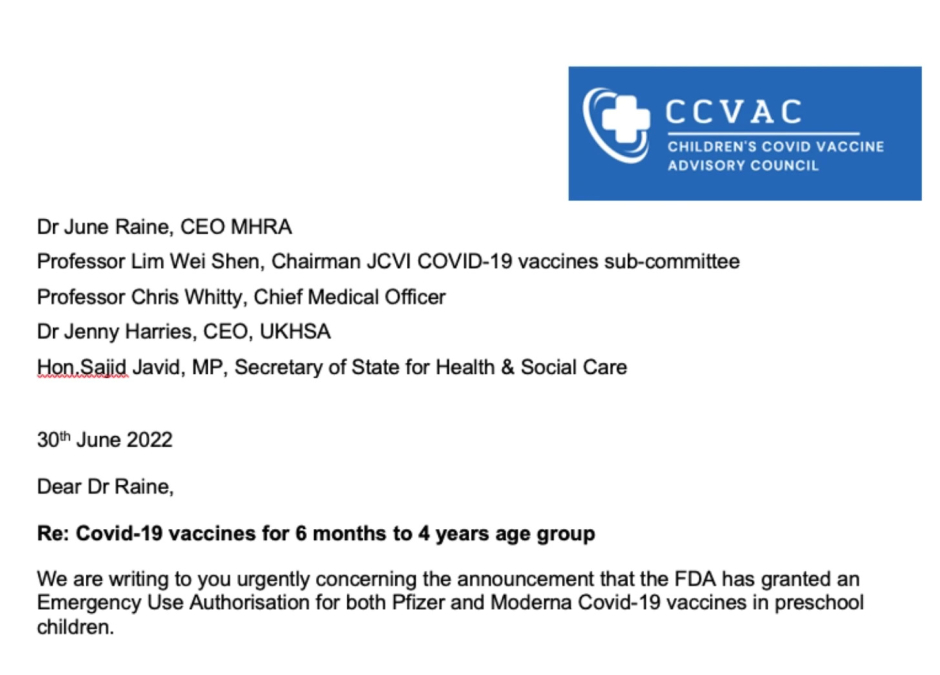By Robert W Malone MD, MS
Who is Robert Malone
July 5, 2022
An open letter to the MHRA:
Below is a letter signed by 76 doctors in the UK, to the Medical and Healthcare products Regulatory Agency (MHRA) and other U.K. Government officials. This letter lays out comprehensive reasons why the recent U.S. FDA decision authorizing COVID vaccinations in infants and young children must not happen in the UK. The letter is well-sourced and accurate. Let us hope that main-stream media here in the USA and in the UK report on this letter in an unbiased fashion.
(the letter continues)
We are writing to you urgently concerning the announcement that the FDA has granted an Emergency Use Authorization for both Pfizer and Moderna COVID-19 vaccines in preschool children.
We would urge you to consider very carefully the move to vaccinate ever younger children against SARS-CoV-2, despite the gradual but significant reducing virulence of successive variants, the increasing evidence of rapidly waning vaccine efficacy, the increasing concerns over long-term vaccine harms, and the knowledge that the vast majority of this young age group have already been exposed to SARS-CoV-2 repeatedly and have demonstrably effective immunity. Thus, the balance of benefit and risk which supported the rollout of mRNA vaccines to the elderly and vulnerable in 2021 is totally inappropriate for small children in 2022.
We also strongly challenge the addition of COVID-19 vaccination into the routine child immunization program despite no demonstrated clinical need, known and unknown risks (see below) and the fact that these vaccines still have only conditional marketing authorization.
It is noteworthy that the Pfizer documentation presented to the FDA has huge gaps in the evidence provided:
- The protocol was changed mid-trial. The original two-dose schedule exhibited poor immunogenicity with efficacy far below the required standard. A third dose was added by which time many of the original placebo recipients had been vaccinated.
- There was no statistically significant difference between the placebo and vaccinated groups in either the 6-23-month age group or the 2-4-year-olds, even after the third dose. Astonishingly, the results were based on just three participants in the younger age group (one vaccinated and two placebo) and just seven participants in the older 2-4-year-olds (two vaccinated and five placebo). Indeed, for the younger age group the confidence intervals ranged from minus-367% to plus-99%. The manufacturer stated that the numbers were too low to draw any confident conclusions. Moreover, these limited numbers come only from children infected more than seven days after the third dose.
- Over the whole time period from the first dose onwards (see page 39 Tables 19 and 20), there were a total of 225 infected children in the vaccinated arm and 150 in the placebo arm, giving a calculated vaccine efficacy of only 25% (14% for the 6-23 months, and 33% for 2-4s).
- The additional immunogenicity studies against Omicron, requested by the FDA, only involved a total of 66 children tested one month after the third dose (see page 35).
It is incomprehensible that the FDA considered that this represents sufficient evidence on which to base a decision to vaccinate healthy children. When it comes to safety, the data are even thinner: only 1,057 children, some already unblinded, were followed for just two months. It is noteworthy that Sweden and Norway are not recommending the vaccine for 5-11s and Holland is not recommending it for children who have already had COVID-19. The director of the Danish Health and Medicines Authority stated recently that with what is now known, the decision to vaccinate children was a mistake.
We summarize below the overwhelming arguments against this vaccination.
